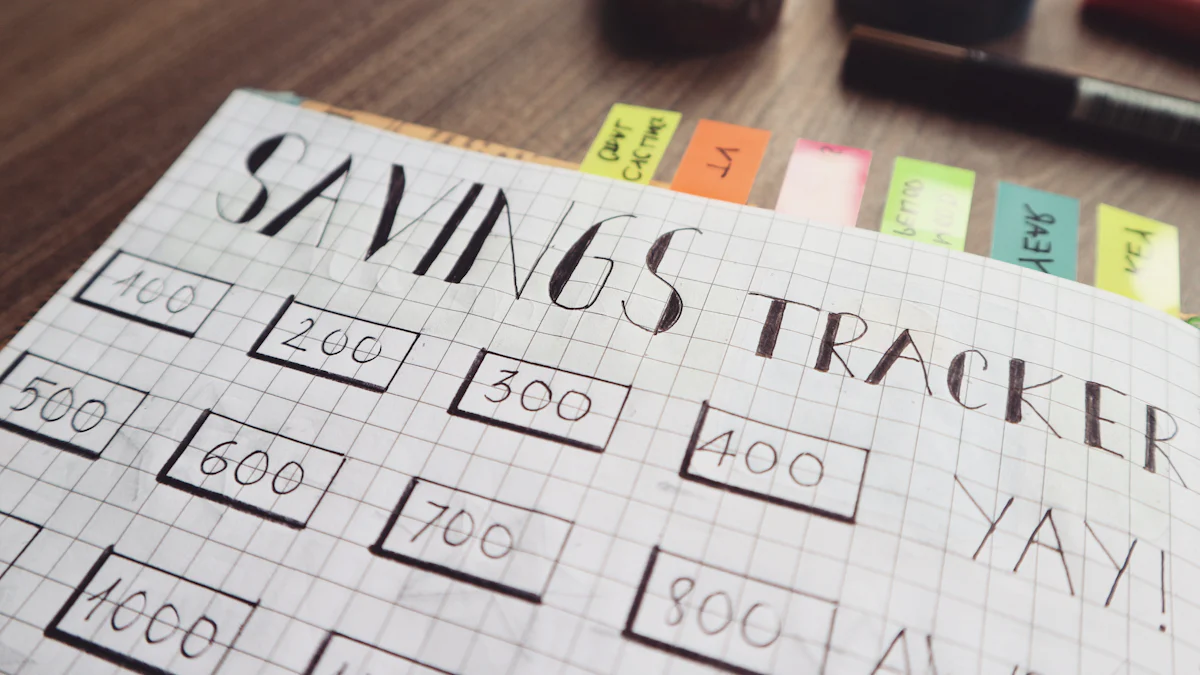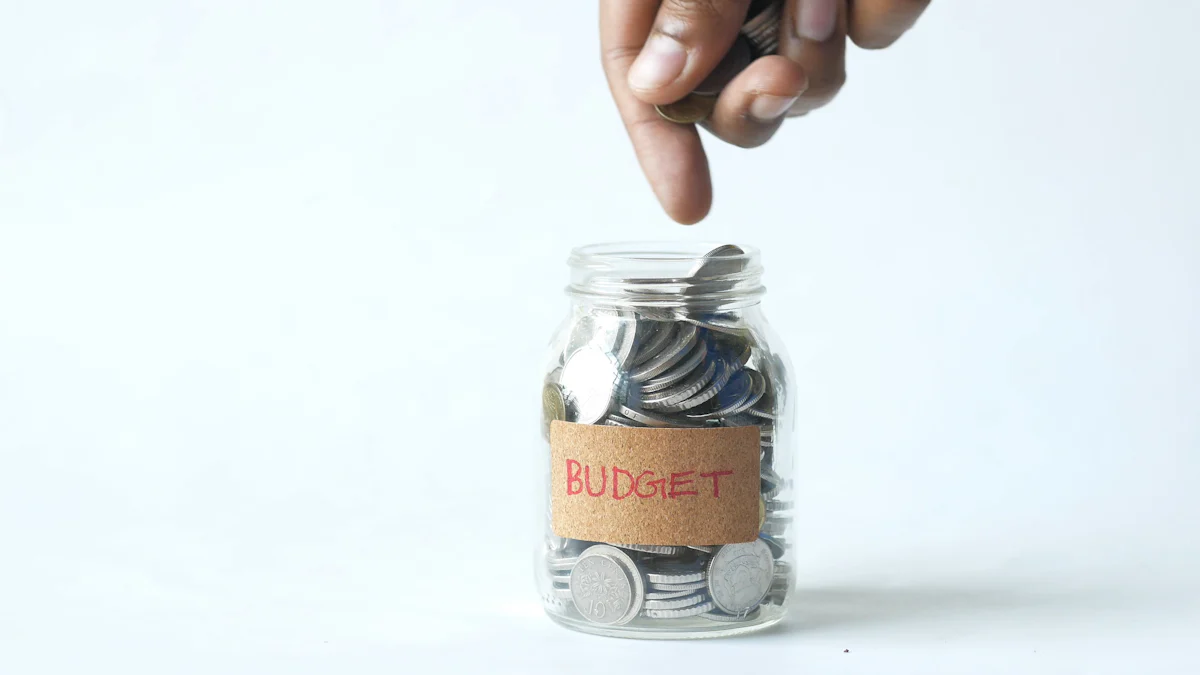Budgeting for Beginners: A Guide to Financial Freedom

Budgeting is simply creating a plan to manage your income and expenses. It’s like giving every dollar you earn a job, so you know exactly where your money is going. Did you know that over 90% of Americans already use a budget to manage their finances?
Why does budgeting matter? Without it, you might find yourself caught off guard by rising costs or unaware of how much you’re actually spending. Many people struggle to achieve financial freedom because they set unrealistic expectations, resist change, or face challenges like inconsistent income.
But here’s the good news: budgeting for beginners doesn’t have to be complicated. It’s your first step toward taking control of your money and building a future where you’re financially free. Why wait? Start today and see how empowering it feels to have a plan in place!
Key Takeaways
A budget is a plan to handle your money. It helps you decide where each dollar should go.
Begin by keeping track of your money coming in and going out. Use apps or simple charts to stay neat and understand your finances better.
Make clear money goals to help with your budget. Saving for emergencies or paying off bills can keep you focused.
Pick a budgeting style that works for you. Methods like the 50/20/30 rule or zero-based budgeting can help you control your spending.
Check and change your budget often. This keeps you on track and ready for any money changes.
What is Budgeting and Why Does it Matter?
Understanding Budgeting
Budgeting is more than just tracking your expenses—it's about creating a personalized plan for your money. Think of it as a roadmap that helps you reach your financial goals. By analyzing your income, expenses, and priorities, you can ensure your spending aligns with what truly matters to you.
At its core, budgeting is a trade-off. You decide where to allocate your money, whether it's for necessities, savings, or fun. This process can result in three outcomes: a surplus (you save more than you spend), a balanced budget (your income equals your expenses), or a deficit (you spend more than you earn). For beginners, starting with a simple plan can make all the difference in building healthy financial habits.
Importance of Budgeting for Beginners
Why is budgeting so essential, especially for beginners? It gives you clarity. You’ll know exactly how much money is coming in and going out. This awareness helps you avoid overspending and manage your cash flow better.
Budgeting also helps you allocate resources wisely. Instead of wondering where your paycheck went, you’ll have a clear framework for spending and saving. It’s like having a financial compass that keeps you on track. Plus, it’s a powerful tool for managing debt. By prioritizing repayments, you can reduce financial stress and work toward financial freedom.
Another key benefit? Budgeting prepares you for the unexpected. Emergencies happen, but with a budget, you can set aside funds to handle them without derailing your goals.
Benefits of Budgeting for Financial Freedom
Budgeting is your ticket to financial freedom. It helps you stick to your goals by creating a clear plan for your money. You’ll learn to prioritize saving, whether it’s for investments, retirement, or an emergency fund.
For families, budgeting can improve life at home. Setting spending limits reduces financial stress, creating a happier environment. It also teaches valuable lessons about saving and making smart financial decisions.
Most importantly, budgeting ensures you only spend what you can afford. This discipline builds a foundation for long-term success. Over time, you’ll find it easier to save, invest, and achieve the independence you’ve always dreamed of.
Step-by-Step Guide to Creating Your First Budget

Assessing Income and Expenses
The first step to creating your budget is to track your income and expenses. Start by listing all your sources of income. This could include your salary, freelance work, or any side hustles. Be honest and realistic about how much money you bring in each month.
Next, take a close look at your expenses. Write down everything you spend money on, from rent and groceries to streaming subscriptions and coffee runs. Don’t forget irregular expenses like annual insurance premiums or holiday gifts. Tracking your income and expenses gives you a clear picture of where your money is going.
To make this process easier, use tools like budgeting apps, spreadsheets, or even a simple notebook. These tools help you stay organized and ensure you don’t miss anything. Once you’ve gathered all the numbers, compare your total income to your total expenses. Are you spending more than you earn? If so, it’s time to adjust your budget plan.
Categorizing Spending
Now that you’ve tracked your income and expenses, it’s time to categorize your spending. This step helps you identify areas where you can cut back or save more. Common spending categories include:
Housing
Transportation
Food
Utilities
Medical/Healthcare
Insurance
Entertainment
Savings
Debt payments
You can also create categories that fit your lifestyle, like travel, personal care, or subscriptions. Once you’ve sorted your expenses, compare your actual spending to your budget plan at the end of the month. Look for discrepancies and ask yourself why they happened. Did you overspend on dining out? Or forget to account for a specific bill? This analysis helps you refine your budget and make better decisions moving forward.
Setting Financial Goals
A budget isn’t just about cutting back—it’s about helping you set your financial goals and achieve them. Think about what you want to accomplish. Do you want to pay off debt, save for a vacation, or build an emergency fund? Write down your goals and make them specific. For example, instead of saying, “I want to save money,” say, “I want to save $5,000 for a down payment in two years.”
Once you’ve set your financial goals, prioritize them. Focus on one or two at a time to avoid feeling overwhelmed. Then, allocate a portion of your income toward these goals in your budget plan. For instance, if you want to save for retirement, set aside a percentage of your paycheck each month.
Tracking your progress is key. Celebrate small wins along the way to stay motivated. Remember, every dollar you save brings you closer to financial freedom.
Choosing a Budgeting Method
Finding the right budgeting method can feel overwhelming, but it doesn’t have to be. The key is choosing one that fits your lifestyle and financial goals. Let’s explore some popular methods to help you decide:
Budgeting Method | Description |
|---|---|
50/20/30 Budget | Allocates 50% of net income to needs, 20% to savings, and 30% to wants. |
Pay Yourself First | Prioritizes savings by paying yourself first before other expenses. |
Zero-Based Budget | Assigns every dollar of income to specific expenses, ensuring a balance of $0 at the end of the month. |
Envelope Budget | Uses physical or digital envelopes to allocate funds for different categories, limiting spending to those amounts. |
Each method has its strengths. For example, the 50/20/30 budget is great for beginners because it’s simple and flexible. If saving is your top priority, the Pay Yourself First method ensures you build your savings before spending on anything else. The Zero-Based Budget works well if you want to track every dollar, while the Envelope Budget helps you control spending in specific categories.
Take a moment to think about your habits and goals. Are you someone who prefers structure, or do you need flexibility? Once you pick a method, stick with it for a few months to see how it works for you.
Tip: If you’re unsure where to start, try the 50/20/30 budget. It’s easy to follow and gives you a balanced approach to managing your money.
Tracking and Adjusting Your Budget
Creating a budget is just the beginning. To make it work, you need to track your spending and adjust as needed. Here’s how you can stay on top of your monthly budget:
Use one platform, like a budgeting app, to simplify tracking.
Check that your spending matches your financial goals.
Record expenses as they happen to avoid missing anything.
Monitor your budget in real-time to catch overspending early.
Set limits for discretionary spending to stay in control.
Review your actual vs. planned spending weekly.
Automate savings to ensure you’re consistently building wealth.
Tracking your budget doesn’t have to be time-consuming. Many apps can sync with your bank accounts, making it easy to see where your money goes. Adjustments are normal, especially if unexpected expenses pop up. If you overspend in one category, reduce spending in another to balance things out.
Note: Regularly reviewing your budget helps you stay on track and avoid surprises. Think of it as a financial check-up that keeps your goals in focus.
By tracking and adjusting your budget, you’ll gain confidence in managing your money. Over time, this habit will bring you closer to financial freedom.
Tips for Sticking to Your Budget
Automating Savings
Saving money doesn’t have to be a chore. Automating your savings is one of the easiest ways to stick to your budget. By setting up automatic transfers to your savings account, you ensure that saving becomes a habit, not an afterthought. Many banks allow you to schedule transfers right after payday, so you don’t even notice the money leaving your checking account.
Consider using high-yield savings accounts to make your money work harder for you. These accounts often offer interest rates above 5%, compared to the national average of 0.46% in 2023. Over time, this can significantly boost your savings.
You can also try round-up savings programs. These tools round up your purchases to the nearest dollar and deposit the spare change into your savings. It’s a simple way to save without changing your spending habits. As your income grows, adjust your savings amount to keep building wealth.
Tip: Use budgeting apps to track your savings progress. Watching your savings grow can keep you motivated!
Using Budgeting Tools
Budgeting tools can make managing your money much easier. Apps like Mint, YNAB (You Need A Budget), or EveryDollar help you track your spending, set goals, and stay on top of your budget. These tools sync with your bank accounts, so you can see where your money goes in real-time.
If you prefer a hands-on approach, spreadsheets are a great option. They let you customize your budget and analyze your spending patterns. For beginners, simple templates can help you get started without feeling overwhelmed.
Some tools even send alerts when you’re close to overspending in a category. This feature can help you stick to your plan and avoid unnecessary expenses.
Note: Choose a tool that fits your style. Whether you like detailed tracking or a quick overview, there’s a budgeting tool for you.
Avoiding Common Budgeting Mistakes
Even with the best intentions, beginners often make mistakes when starting a budget. One common error is underestimating expenses. Forgetting about irregular costs like car repairs or holiday gifts can throw off your plan. To avoid this, include a buffer for unexpected expenses.
Another mistake is setting unrealistic goals. If your budget feels too restrictive, you might give up. Start small and focus on achievable targets. Tracking your spending is also crucial. Without it, you won’t know if you’re sticking to your budget.
Don’t forget to plan for emergencies. Life happens, and having an emergency fund can save you from financial stress. Finally, always write down your budget. A written plan keeps you accountable and helps you stay on track.
Reminder: Budgeting for beginners is a learning process. Mistakes are normal, but each one teaches you how to manage your money better.
Staying Motivated and Rewarding Progress
Sticking to a budget can feel challenging at times, but staying motivated makes all the difference. Think of your budget as a tool that helps you achieve your dreams. To keep your spirits high, try these strategies:
Set up automatic payments for bills and savings. This removes the temptation to overspend and ensures you’re always on track.
Pause before impulse purchases. Ask yourself, “Do I really need this?” Waiting 24 hours can help you avoid unnecessary spending.
Track small expenses. Those daily coffee runs or snack purchases add up quickly. Seeing the total can motivate you to cut back and save more.
Use budgeting apps to simplify the process. Apps like Mint or YNAB make it easy to monitor your progress and adjust your plan.
Find an accountability buddy. Share your goals with a trusted friend or family member. They can encourage you and celebrate your wins.
Rewards are just as important as discipline. When you hit a milestone, treat yourself! For example, if you save $500 toward your emergency fund, enjoy a small splurge like a nice dinner or a new book. Rewards don’t have to break the bank—they just need to feel meaningful.
Visualizing your goals can also keep you motivated. Create a vision board or use a savings tracker to see how close you are to achieving your dreams. Every step forward, no matter how small, is progress worth celebrating.
Tip: Motivation grows when you focus on the “why” behind your budget. Whether it’s financial freedom, a dream vacation, or a secure retirement, remind yourself of the bigger picture. You’ve got this!
How Budgeting Leads to Financial Freedom

Reducing Debt
Budgeting is a powerful tool for tackling debt. It helps you prioritize repayments and set aside money specifically for debt obligations. By creating a clear plan, you can pinpoint areas where you’re overspending and redirect that money toward paying off debt. For example, cutting back on dining out or canceling unused subscriptions can free up extra cash for your credit card or loan payments.
When you focus on paying off debt, you reduce financial stress and free up more of your income for other goals. A structured approach, like the snowball or avalanche method, can make the process even more effective. The snowball method involves paying off smaller debts first to build momentum, while the avalanche method targets high-interest debts to save money in the long run. Whichever method you choose, budgeting ensures you stay on track and make consistent progress.
Tip: Celebrate small wins, like paying off a credit card, to stay motivated. Every step brings you closer to financial freedom.
Building Savings
A solid budget helps you build savings by making it a priority. Instead of waiting to see what’s left at the end of the month, you allocate money for savings right from the start. This approach, often called "paying yourself first," ensures you’re consistently setting aside funds for your future.
Savings aren’t just for emergencies. They’re also for achieving your dreams, like buying a home, starting a business, or taking a dream vacation. High-yield savings accounts can help your money grow faster, thanks to higher interest rates. Automating your savings makes the process even easier. You won’t have to think about it—it just happens.
Reminder: Regularly review your budget to adjust your savings goals as your financial situation changes. Flexibility is key to staying on track.
Enabling Smart Investments
Once you’ve paid off debt and built an emergency fund, your budget can help you start investing. Investments are essential for building wealth and achieving long-term financial freedom. By allocating a portion of your income to investments, you can grow your money over time.
Budgeting gives you the clarity to decide how much you can afford to invest. Whether it’s stocks, bonds, or real estate, having a plan ensures you’re not overextending yourself. It also helps you stay consistent, which is crucial for long-term success.
Note: Educate yourself on investment options to make informed decisions. The more you know, the better you can grow your wealth.
By reducing debt, building savings, and enabling smart investments, budgeting sets the stage for financial freedom. It’s not just about managing money—it’s about creating a life where you’re in control of your finances and your future.
Achieving Financial Independence
Achieving financial independence might sound like a big goal, but it’s absolutely possible with the right plan. It’s all about taking control of your money so you can live life on your terms. Here’s how you can get started:
Understand your financial situation
Start by evaluating your income sources. Write down how much money you bring in each month. Then, categorize your expenses into two groups: non-discretionary (needs like rent and groceries) and discretionary (wants like dining out or entertainment). This step gives you a clear picture of where your money is going.Create savings goals
Think about what you want to achieve. Do you need an emergency fund? Are you saving for a big purchase or retirement? Set both short-term and long-term goals. For example, aim to save three to six months’ worth of expenses for emergencies. Prioritizing savings helps you stay prepared for the unexpected while working toward financial freedom.Determine your budgeting method
Choose a budgeting method that fits your lifestyle. The 50/30/20 rule is a great option. Allocate 50% of your income to needs, 30% to wants, and 20% to savings or debt repayment. This method keeps your spending balanced while helping you save consistently.
By following these steps, you’ll build a strong foundation for financial independence. Budgeting isn’t just about cutting back—it’s about creating opportunities. When you manage your money wisely, you can reduce stress, enjoy more freedom, and focus on what truly matters.
Remember, financial freedom doesn’t happen overnight. It’s a journey that requires patience and persistence. Stick to your plan, track your progress, and celebrate every milestone. You’re closer to achieving financial independence than you think!
Tip: Keep reminding yourself why you started. Whether it’s retiring early, traveling the world, or simply living debt-free, your “why” will keep you motivated.
Budgeting for beginners is your gateway to financial freedom. It helps you control spending, achieve your goals, and build a secure future. Start by assessing your income and expenses. Create a plan that aligns with your priorities and stick to it. Remember, “Financial freedom is available to all those who learn about it and work for it.” — Robert Kiyosaki.
Take charge of your money today. Every small step brings you closer to a life free from financial stress. Why wait? Begin your journey to financial freedom now!
See Also
Starting Your Personal Finances Early: A Smart Move
Everyday Practices of Those Who Achieve Financial Success
Navigating Risk and Return for Intelligent Investment Choices
Recovering and Growing Wealth: The Power of Financial Resilience
Understanding Emotions in Investing: Conquering Fear and Greed

